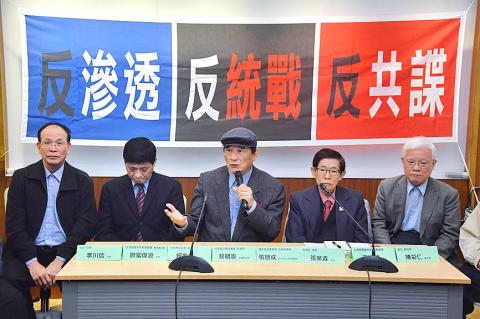Former ministry of national defense Michael Tsai (蔡明憲) yesterday called for greater caution against Beijing’s infiltration, saying that high-level Chinese Communist Party (CCP) officials had tried to establish contact with him months after he left office in May 2008.
“China’s infiltration programs target not only the Chinese Nationalist Party [KMT] and the media, but also people in the pan-blue camp and even those in the Democratic Progressive Party [DPP] and the pan-green camp,” Tsai told a news conference in Taipei.
A Taiwanese entrepreneur doing business in China had relayed a message to him from China’s Taiwan Affairs Office (TAO), he said.

Photo: CNA
“The TAO wanted to invite me to attend an international conference in China and they said I would be received by the leader of the CCP,” he said.
“I thought that was very strange because I had stepped down less than eight months ago. So I firmly refused,” Tsai said.
While self-confessed Chinese spy William Wang Liqiang’s (王立強) stories about China’s intelligence operations in Taiwan have brought more attention to the subject, the discussions have only touched the tip of the iceberg, he said.
The National Security Council in September said that China had been using all possible means to influence the Jan. 11 elections and proposed five countermeasures, so “I hope President Tsai Ing-wen’s (蔡英文) national security team would fully implement those measures,” Tsai added.
The DPP caucus’ version of an anti-infiltration bill, which stipulates a prison term of up to seven years or a fine of NT$5 million (US$163,866) for those who act on behalf of “foreign forces” to disrupt social order, and bans political donations and other political activities under the instructions of such forces, advanced to a second reading on Friday.
The KMT had previously obstructed the bill, but is now proposing an alternative, which would prevent the “annexation of the Republic of China.”
The KMT boycotted the legislative meeting on Monday last week to “prevent the DPP from posting the voting results online and portraying the KMT as siding with Beijing on Chinese interference,” KMT Legislator Alicia Wang (王育敏) said on Friday.
Meanwhile, Taiwan Association of University Professors president Lai Cheng-chang (賴振昌) said “the biggest national security problem” is that the government has to deal with groups of Taiwanese who support the CCP from within the nation.
For example, when Wang’s allegations were first reported, many in the pan-blue camp took the same stance on his claims as the CCP’s, Lai said.
The Reverend Omi Wilang, a Presbyterian minister, said the CCP has been trying to win the hearts of Taiwanese religious groups even as it cracks down on religious freedom in China.
“We strongly condemn the way in which the CCP has been tearing down churches and temples in China while inviting Taiwanese religious groups to China and offering them special treatments,” he said. “The two-faced approach is also part of its tactic to promote unification.

Taiwan is gearing up to celebrate the New Year at events across the country, headlined by the annual countdown and Taipei 101 fireworks display at midnight. Many of the events are to be livesteamed online. See below for lineups and links: Taipei Taipei’s New Year’s Party 2026 is to begin at 7pm and run until 1am, with the theme “Sailing to the Future.” South Korean girl group KARA is headlining the concert at Taipei City Hall Plaza, with additional performances by Amber An (安心亞), Nick Chou (周湯豪), hip-hop trio Nine One One (玖壹壹), Bii (畢書盡), girl group Genblue (幻藍小熊) and more. The festivities are to

Auckland rang in 2026 with a downtown fireworks display launched from New Zealand’s tallest structure, Sky Tower, making it the first major city to greet the new year at a celebration dampened by rain, while crowds in Taipei braved the elements to watch Taipei 101’s display. South Pacific countries are the first to bid farewell to 2025. Clocks struck midnight in Auckland, with a population of 1.7 million, 18 hours before the famous ball was to drop in New York’s Times Square. The five-minute display involved 3,500 fireworks launched from the 240m Sky Tower. Smaller community events were canceled across New Zealand’s

The Ministry of Foreign Affairs (MOFA) yesterday said it is closely monitoring developments in Venezuela, and would continue to cooperate with democratic allies and work together for regional and global security, stability, and prosperity. The remarks came after the US on Saturday launched a series of airstrikes in Venezuela and kidnapped Venezuelan President Nicolas Maduro, who was later flown to New York along with his wife. The pair face US charges related to drug trafficking and alleged cooperation with gangs designated as terrorist organizations. Maduro has denied the allegations. The ministry said that it is closely monitoring the political and economic situation

‘SLICING METHOD’: In the event of a blockade, the China Coast Guard would intercept Taiwanese ships while its navy would seek to deter foreign intervention China’s military drills around Taiwan this week signaled potential strategies to cut the nation off from energy supplies and foreign military assistance, a US think tank report said. The Chinese People’s Liberation Army (PLA) conducted what it called “Justice Mission 2025” exercises from Monday to Tuesday in five maritime zones and airspace around Taiwan, calling them a warning to “Taiwanese independence” forces. In a report released on Wednesday, the Institute for the Study of War said the exercises effectively simulated blocking shipping routes to major port cities, including Kaohsiung, Keelung and Hualien. Taiwan would be highly vulnerable under such a blockade, because it